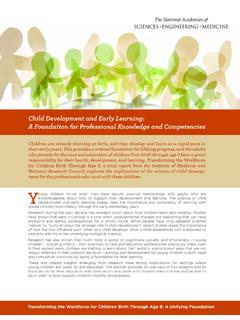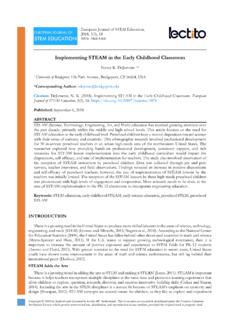Transcription of Child Development Knowledge and Teachers of Young …
1 Child Development Knowledge and Teachers of Young Children by Lilian G. Katz Catalog #217; 1997 Table of Contents Preface Part I: Child Development Knowledge and Teachers of Young Children What Is Meant by the Term Child Development ? Application of Child Development Knowledge What Child Development Knowledge Should Be Learned? Where Do We Go from Here? References Part II: A Developmental Approach to early childhood Education Defining the Developmental Approach to early childhood Education Some Principles of a Developmental Approach to Curriculum Conclusion References This publication was prepared with funding from the Department of Education.
2 The opinions expressed in this publication do not necessarily reflect the positions or policies of the Department of Education. Preface Lilian G. Katz, The two parts of this monograph explore issues surrounding the place of Child Development Knowledge in early childhood education. In particular, Part I raises questions concerning the role of such Knowledge in the teaching of Young children and its place in teacher education. This part takes up the following questions: What does the term " Development " mean? What Child Development Knowledge should be learned? Can we agree on a body of Child Development Knowledge and principles that must be mastered by students?
3 Why has the role of Child Development Knowledge in pedagogy become a contentious issue? The implications of possible answers to these questions are also discussed. Part II presents a brief outline of how understandings of the nature of Child Development can be used to generate basic principles of practice for early childhood education that satisfy developmental criteria. Nineteen principles of early childhood practice are proposed that, taken together, have many implications for planning curricula and programs for Young children. Selected ERIC bibliographies on early childhood teacher education and developmentally appropriate practices in early childhood education are included in this publication for the convenience of the reader.
4 An earlier version of Part I of this paper was published in early childhood Research Quarterly (volume 11, number 2, 1996). Part I: Child Development Knowledge and Teachers of Young Children Child Development Knowledge and Teachers of Young Children The purpose of this publication is to explore some of the widely held assumptions concerning the role of Child Development Knowledge in teaching Young children. These assumptions first came into question in the process of preparing a commentary on four essays written by early childhood practitioners in response to the question "What is needed to move beyond an initial level of competence as an early childhood teacher?
5 " (Katz, 1994). The four essayists nominated a variety of competencies that most likely apply to Teachers of children of all ages and not solely to Teachers of preschoolers. Examples of some of the competencies nominated included that " Teachers should have clear goals," and "should be life-long learners," and others that are pertinent to Teachers of all age groups. However, one competence recommended without apparent hesitation by all four essayists-and not likely to be suggested for Teachers at other levels-is "the possession of a thorough Knowledge of Child Development ." Similarly, the assumption that Child Development Knowledge is essential for early childhood Teachers emerged in a survey conducted in England ( early childhood Education Research Project, 1994).
6 The majority of head Teachers (principals) representing every type of early childhood setting ranked " Knowledge of Child Development " as the single most influential contributor to the professional Development of practitioners who work with children under 8 years of age. The Teachers surveyed ranked " Knowledge of School Subjects" relatively low as a factor contributing to the competence of early childhood practitioners. Even the heads of schools for statutory [compulsory] age children rated " Knowledge of School Subjects" lower in importance to teaching competence than Knowledge of Child Development . In combination, the four essays by early childhood practitioners in the United States, and the results of the early childhood Education Research Project in England, provoked a discussion with a close colleague concerning precisely how Knowledge of Child Development might influence teaching practices.
7 We began by speculating about how Knowledge of the nature of physical Development -to say nothing of Knowledge of social Development -might or should influence the pedagogical and curriculum decisions of Teachers of Young children. Our first assumption was that on the basis of Knowledge of physical Development a teacher would assume that 4-year-olds are "by nature" physically active and therefore cannot remain still for very long; we agreed that this principle of physical Development should be taken into account in planning curriculum and designing pedagogy. On further reflection, however, we realized that this developmental principle may have limited generalizability.
8 In many countries, Young children-even toddlers-sit still for what seem to observers to be very long periods of time. I recall my own initial amazement when first observing large groups of preschoolers in the People's Republic of China sitting for long periods watching quietly as their classmates performed songs and dances. We then acknowledged that Young children in our own country are capable of being still for extended time periods as, for example, during the lamentably long periods they sit in front of television sets. These examples, of course, should not be taken to imply that Young children necessarily like to sit still for very long periods or that such experiences enhance their physical, social, or intellectual Development .
9 Nonetheless, this discussion and reflection led me to question the tacit assumptions implied by the four essayists and our English colleagues, namely, that mastery of Child Development Knowledge and principles can contribute significantly and positively to competence in teaching and curriculum planning for Young children. These discussions in turn lead me to question what is meant by the term Development in general, and Child Development in particular, and whether it is reasonable to assume that there is an agreed-upon body of Child Development Knowledge and principles for Teachers to use as a basis for decisions about appropriate curriculum and pedagogical practices.
10 As a result of the reflections that resulted from the discussions, I no longer possess the certainty I once had concerning the reliability of Child Development Knowledge and hence its value to Teachers of Young children. The discussion that follows outlines my struggle with the "conceptual itch" that arose from the questions referred to above. What Is Meant by the Term Child Development ? As a noun, Development refers to the end of a process of bringing something from latency to fulfillment (American Heritage Dictionary, 1993). As a verb, it means to "cause to become more complex or intricate; to cause gradually to acquire specific roles, functions, or forms, to grow by degrees into a more advanced or mature state.








